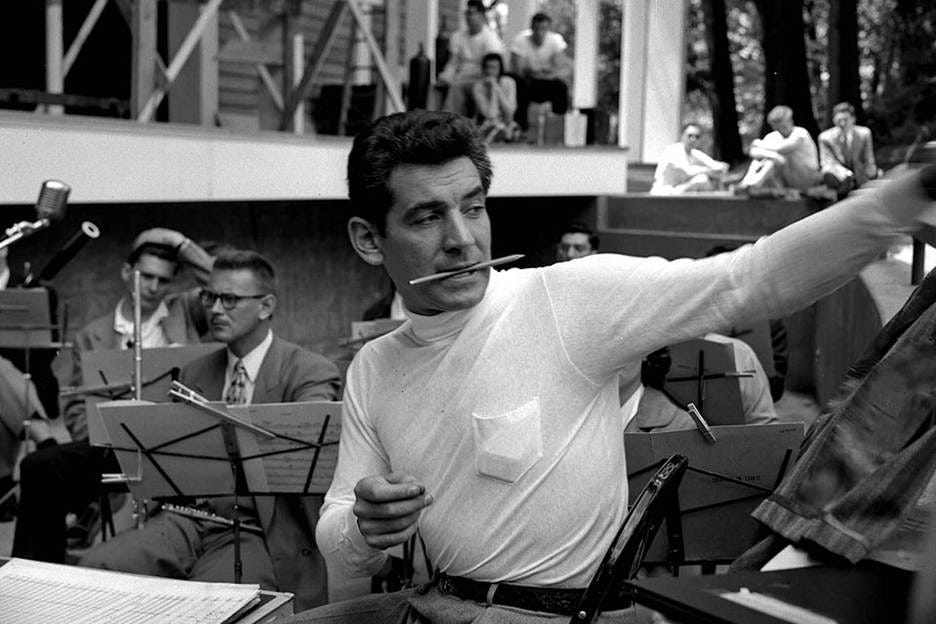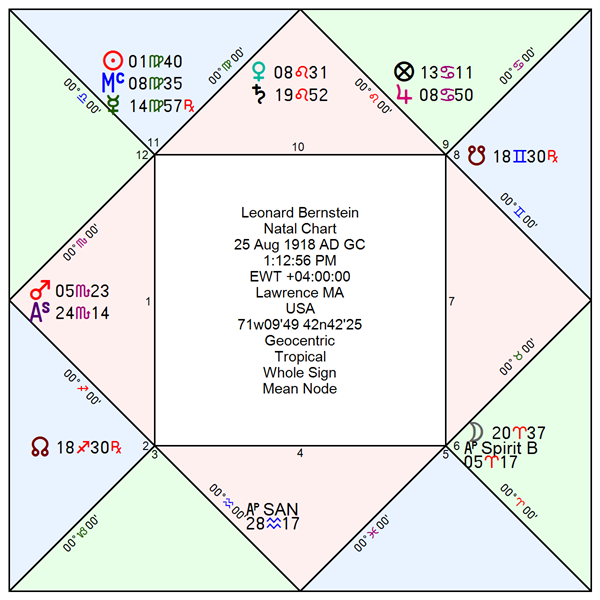Leonard Bernstein (1918-1990)
When the Moon of fire answers to Saturn’s law, even joy must conduct itself.
Leonard Bernstein was born under a Moon that separates from Saturn and reaches for the Sun—a life illuminated by the struggle between discipline and radiance, conscience and glory. For Bernstein, Saturn is not the totalitarian Saturn in Leo of Adolf Hitler because Bernstein’s Saturn is placed in the bound of Mercury in Leo, the planet-sign signification for hope an optimism of the human condition delivered in a blockbuster style. Saturn placed in this bound adds discipline, duty, and gravity.
As the Moon crossed into Taurus and trined the Sun in Virgo, its light moved toward visibility and recognition as the Taurus Moon is received by the celebrity of Venus in Leo. Yet the Sun, ruled by Mercury in Virgo retrograde, drew its meaning from another source—the supple intelligence of Mercury functioning as if placed in the opposite sign of Pisces. Bernstein’s genius thus found expression not through calculation but through motion: the liquid grace of his hands, the intuitive phrasing that made intellect itself appear spontaneous. The public saw the Sun’s brilliance; the true architect was Mercury behind it.
Still, his chart finds redemption in performance. Each time he raised his baton, the Moon’s light bridged the chain of command—from Saturn’s conscience through the Sun’s fame to Mercury’s mind—structure becoming passion, intellect made flesh. In Bernstein’s life the heavens composed their own score: a symphony of duty and ecstasy, never resolved, always radiant.
Leonard Bernstein was born in Lawrence, Massachusetts, on August 25, 1918, the eldest child of Ukrainian-Jewish immigrants. From an early age he combined exuberant musical instinct with formidable discipline—a lifelong pattern of passion governed by structure. After studies at Harvard and the Curtis Institute, he rose to international fame overnight in 1943 when, at age twenty-five, he substituted for Bruno Walter with the New York Philharmonic. His debut electrified the nation and established him as the first great American-born conductor of global stature.
Throughout his career, Bernstein united brilliance with conscience. As music director of the New York Philharmonic (1958–1969), he brought symphonic music to a mass audience through his televised Young People’s Concerts and Omnibus programs, combining warmth, erudition, and showmanship in a new model of public education. His podium style—intense, physical, and communicative—made him an international symbol of artistic leadership. Traveling widely, he conducted the major orchestras of Europe, Israel, and Japan, and used his platform to champion humanitarian ideals and cultural diplomacy.
As a composer, Bernstein bridged the worlds of Broadway and the concert hall. On the Town, Candide, and West Side Story embodied postwar American optimism, while his symphonies, Kaddish, Mass, and Dybbuk sought moral and spiritual depth. Though he longed to be recognized equally for his serious works, audiences most readily embraced his melodic and theatrical voice—a paradox that reflected both his genius and his times.
Bernstein’s later years were filled with retrospection and triumph. His 1989 performance of Beethoven’s Ninth Symphony in Berlin, celebrating the fall of the Wall, became a global symbol of reconciliation and freedom. Honored with a Grammy Lifetime Achievement Award and countless accolades, he remained a tireless advocate for music as a force of understanding among peoples.
Leonard Bernstein died in New York City on October 14, 1990, leaving behind an indelible legacy of brilliance, generosity, and moral energy—a life in which art, intellect, and humanity moved always in concert.
Rodden Rating B, Bio/autobiography, 1:00 PM, ASC 21SC44
Proposed rectification: 1:12:56 PM, ASC 24SC14’22”
Complete biographical chronology and time lord studies available in Excel format as a paid subscriber benefit.
Victor Model factors favoring Mercury in Virgo – Retrograde
· Sign ruler of MC and Sun
· Bound ruler of Sun and Lot of Fortune
· Position in the 10th house (quadrant houses)
· Dignity by sign and exaltation
· Square Lunar Nodes within 5 degrees
Physigonomy Factors favoring Scorpio, Aries
· Rising sign is Scorpio housing Mars in Scorpio. Delineation match to dark eyebrows which contrast with the complexion of his forehead; hair which is wavy, thick, luxurious.
· Rising decan is Cancer ruled by Moon in Aries. Delineation match to bony ovate shape of face. Photos which are dead on without Bernstein smiling show cheeks which are lean consistent with the bony ovate of Aries in Willner’s model
Moon’s Configuration
The aspect sequence is as follows:
Moon in Aries: separates from trine of Saturn
(birth moment)
Moon in Taurus: applies to trine of Sun in Virgo (Mercury ruled)
Moon in Taurus: applies to opposition of Mars
Moon in Taurus: applies to sextile of Jupiter
Moon in Taurus: applies to trine of Mercury
Moon in Taurus: applies to square of Saturn
Phase I – Moon Separating from Saturn (Leo → Aries)
Delineation. Saturn in Leo unites brilliance with law. It is the condition of fame bound to responsibility, the fire of Leo placed in the service of moral structure. When the Moon separates from this Saturn, emotion departs from authority yet remains stamped by its discipline. The native carries conscience into every expression of vitality. Saturn’s rulership over the performing sign of Leo makes the artist a custodian of order: radiance purified by form.
Biographical Match. Bernstein’s career embodied this Saturnian dignity. Even at his most exuberant he conducted under inner command, not abandon. Each sweeping gesture revealed rigor beneath theatricality—the Leo performer answering to Saturn’s demand for purpose. Politically, he bore the same signature: hosting the Black Panthers in his Dakota apartment, he enacted the inversion of Leo’s kingship into Saturn’s social conscience—glory humbled into service. His Moon separating from Saturn thus describes the emotional tension of a man who must discipline joy before offering it to the world.
Saturn in Leo Exemplified – The Dybbuk. Saturn’s transit across Bernstein’s Lot of Fortune in 1974–75 reveals the stamp of Saturn in Leo on musical composition. The Dybbuk Variations and Suites Nos. 1 and 2 are the audible form of Saturn in Leo—creative fire constrained within sacred geometry. Their twelve-tone design, austere orchestration, and Kabbalistic symbolism turn performance into moral rite. In The Dybbuk Bernstein confronted fame’s shadow: the desire to sanctify his artistry through discipline. Critics found the work severe, but astrologically it was the Saturnian culmination of his Leo calling—radiance filtered through conscience.
Phase II – Moon Changing Signs to Taurus (Ruled by Venus in Leo)
Delineation. As the Moon leaves Aries for Taurus, her fiery impulse seeks permanence and physical embodiment. Taurus, ruled by Venus in Leo, converts discipline into performance and structure into pleasure. The Moon now desires not simply to know form but to show it. The ingress shifts energy from intellectual control to visible artistry—beauty made tangible and theatrical.
Biographical Match. This transition parallels Bernstein’s emergence from academic prodigy to global celebrity. The conductor’s body became his language; the podium his stage. Under Venus’s rulership, the Moon’s expressive drive manifested through charisma and sensual command—the famous smile, the kinetic hands, the joyous physicality that made his interpretations irresistible. Here the public first met Saturn’s severity softened by Venus’s delight, moral purpose rendered as spectacle.
Phase III – Moon Applying to the Sun in Virgo (10th House, Ruled by Mercury in Virgo, Retrograde)
Delineation. The Moon’s next application is a trine to the Sun in Virgo, a passage from disciplined emotion to radiant self-expression. When the Moon applies to the Sun, fame itself becomes the vessel of realization—light joining light—but never without the question of what that light reveals. The Sun in Virgo is ruled by Mercury both by sign and bound, so the lunar application does not end with mere celebrity; it reaches into the intellect that governs musical proportion and language. Mercury retrograde here acts as though placed in Pisces, imparting a liquid, supple, and rhythmically fluent nature—essential to the musician’s art.
Biographical Match. Bernstein’s ascent from Saturn’s rigor to solar glory came through the visibility of performance—televised lectures, world tours, and his 1989 Berlin Ninth Symphony after the Wall’s fall. These acts fulfilled the Moon-Sun promise of renown in the 10th house. Yet the Sun’s ruler, Mercury, bestowed a distinctly Piscean fluidity. Gunther Schuller observed this physical manifestation:
“We were all bowled over by Bernstein’s conductorial talent, especially the lightninglike almost explosive physical energy, his ability to abandon himself totally to the music and yet not lose technical control… What I noticed particularly was the suppleness of Bernstein’s hands; it was as if he had ball bearings in his wrists that enabled him to bend, flex, rotate them at will—a remarkable gift, that I believe …was unique to him.”
—Gunther Schuller, quoted in Allen Shawn, Leonard Bernstein: An American Musician (Yale, 2014), p. 78.
This description captures Mercury retrograde functioning as Mercury in Pisces: motion imbued with grace, technique animated by empathy. The Moon’s trine to the Sun thus represents both visibility and the transmission of inner rhythm through gesture—the conductor as radiant artisan.
Phase IV – The Chain of Aspects and Mercury as Victor
Delineation. After separating from the Sun, the Moon’s course unfolds through a dense sequence: opposition to Mars, sextile to Jupiter, square to Venus, trine to Mercury, and finally square to Saturn. This progression mirrors a life spent traversing every sphere of experience before returning to the discipline from which it began. By the time the Moon reaches Mercury—the victor of the horoscope—so much energy is dispensed to Mars, Jupiter, and Venus, that there sometimes is little left for Mercury. The trine’s lateness signifies genius arriving just before silence.
Biographical Match. Bernstein longed to be remembered as a serious composer of classical music, not for his Broadway successes. Works like Mass and The Dybbuk were his appeals to posterity—architecture, not entertainment. Even near death he told friends he looked forward to more time for composition—but then he died, evidence of diverted energies to Marsian, Jupiterian, and Venusian pursuits leaving insufficient time for Bernstein to engage in composition - a Mercury signification. With Mercury the victor of the horoscope, Bernstein felt unfulfilled in his life’s work despite having accomplished so much.
Keep reading with a 7-day free trial
Subscribe to House of Wisdom to keep reading this post and get 7 days of free access to the full post archives.



